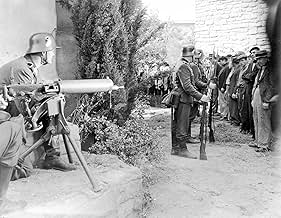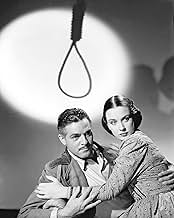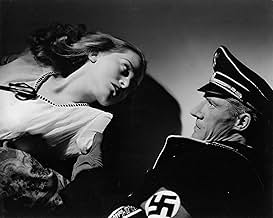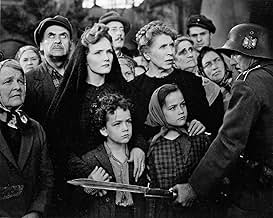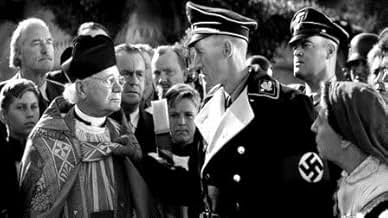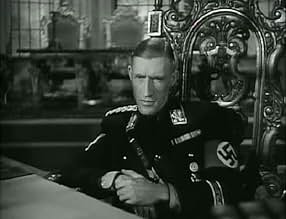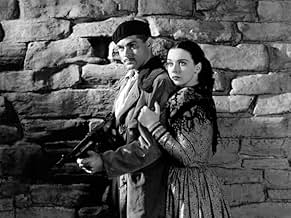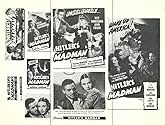Story of the assassination of Reinhard Heydrich, Nazi SS commander, by Czech partisans and the reprisals inflicted by the Nazis on the Czechs.Story of the assassination of Reinhard Heydrich, Nazi SS commander, by Czech partisans and the reprisals inflicted by the Nazis on the Czechs.Story of the assassination of Reinhard Heydrich, Nazi SS commander, by Czech partisans and the reprisals inflicted by the Nazis on the Czechs.
Ludwig Stössel
- Herman Bauer
- (as Ludwig Stossel)
Enrique Acosta
- Prisoner
- (uncredited)
Fred Aldrich
- German Machine Gunner
- (uncredited)
Nellie Anderson
- Old Lady Masaryk
- (uncredited)
Louis V. Arco
- German Sergeant
- (uncredited)
Richard Bailey
- Anton Bartonek
- (uncredited)
Wilmer Barnes
- Officer
- (uncredited)
Walter Bonn
- Military Doctor
- (uncredited)
Chet Brandenburg
- Linesman
- (uncredited)
Featured reviews
An interesting movie that does not do much to inspire the viewer through its portrayal of the Czech resistance, though they face a grim ending, but definitely catches the interest in the portrayal of Nazi brutality through the part played by John Carradine as Reich Protector Heydrich, who routinely had people shot in order to maintain a level of fear and control. The characterizations of the townspeople are too quaint for this subject, but they (the townspeople) do catch on as Carradine's brutality increases, with the most memorable scene being when he and his men take over a philosophy class, in a scene that manages to get fairly intense. If it were just up to Alan Curtis to carry the film as Karel Vavra, the film would fall into a dark pit of boredom, since within any resistance movement there is always collaborators within families that need to be killed. Those characters are all left out, and so the drama quotient is not very intense. Nonetheless, Carradine's Heydrich is definitely worth watching.
This tragic, sad and depressing film made in 1943 depicted the atrocities of the Nazi regime and their supporters in Prague during World War II. Unfortunately, and very sadly, this brutal, sadistic and horrible behavior continues in the world we live in today. Face it, man has made little progress in the area of peace and love since the beginning of time. Sure, we have advanced by leaps and bounds when it comes to technology, medication, etc., but we are still murdering each other day in and day out and in most instances for things as meaningless as cutting someone off in traffic. Is their hope for us as a people. Can mankind live in Peace; sadly, I doubt it.
This film story of the assassination of Reinhard Heydrich (titled by the Nazis as Reichs Protector of Bohemia and Moravia, by the Czechs as "The Hangman", and also one of the architects of "The Final Solution")and of the subsequent annihilation of the village of Lidice by the Nazis, really does not do justice to the subject. Although released by MGM, it was actually produced by poverty row Producer Releasing Corporation (PRC). Some of the cast members are old familiars and rather good, but none give a feeling that these are Czechs being murdered by Hitler's minions. As war propaganda, it is a success, and it at least gives the spirit of the tragedy of Lidice, if not historically detailed facts. John Carradine is effective as Heydrich, especially in his deathbed scene.
The facts about the assassination briefly are that two Czech partisans were parachuted into Czechoslovakia from an RAF plane. They managed to ambush Heydrich's open Mercedes, throw a bomb under it, and escape to a church. Heydrich died a few days later from complications arising from the penetration of his spleen by bomb fragments and debris from the car upholstery. Using torture, the Nazis discovered the whereabouts of the two partisans and the SS killed them at once. Lidice was picked more or less at random from among villages known to have anti-German leanings. On Hitler's orders, the men were shot and the women and children removed to camps, while the buildings of the site were levelled. When it became known in the allied world, this made excellent anti-Nazi propaganda, and more than one film was made of the subject. It may be that the massive retaliation backfired somewhat on the Nazis also by stiffening Czech resistance to the occupation.
The facts about the assassination briefly are that two Czech partisans were parachuted into Czechoslovakia from an RAF plane. They managed to ambush Heydrich's open Mercedes, throw a bomb under it, and escape to a church. Heydrich died a few days later from complications arising from the penetration of his spleen by bomb fragments and debris from the car upholstery. Using torture, the Nazis discovered the whereabouts of the two partisans and the SS killed them at once. Lidice was picked more or less at random from among villages known to have anti-German leanings. On Hitler's orders, the men were shot and the women and children removed to camps, while the buildings of the site were levelled. When it became known in the allied world, this made excellent anti-Nazi propaganda, and more than one film was made of the subject. It may be that the massive retaliation backfired somewhat on the Nazis also by stiffening Czech resistance to the occupation.
Let's not kid ourselves, "Hitler's Madman" is not only no masterpiece but pretty terrible in places yet director Douglas Sirk's movie about the assassination of Heydrich, made almost as the events themselves were unfolding, has great moments. There are scenes here as good as any in war movies, just as there are B-Movie moments as bad as any in B-Movies. Certainly the events portrayed are harrowing enough for this to feel like the ultimate feel-bad movie; perhaps what is most astonishing is that it was made at all while the war was still going on.
It's let down, (badly), by some awful acting but redeemed by Sirk's brilliant handling of individual scenes and by a terrific performance from John Carradine as Heydrich, (his death scene is Oscar-worthy). It may not stick very closely to the events but it's still preferable to the more recent movie dealing with the same subject.
It's let down, (badly), by some awful acting but redeemed by Sirk's brilliant handling of individual scenes and by a terrific performance from John Carradine as Heydrich, (his death scene is Oscar-worthy). It may not stick very closely to the events but it's still preferable to the more recent movie dealing with the same subject.
From his relatively safe base in England, Czech soldier Alan Curtis (as Karel Vavra) parachutes into his former hometown of Lidice, now controlled by bloodthirsty German Nazis. The village is a resource-rich riverside farming community, now helping to fatten Hitler's madmen. Hiding out and encouraging residents to support British allies through sabotage, Mr. Curtis reacquaints himself with glamorous schoolteacher Patricia Morison (as Jarmilla Hanka). While on his mission to bolster local resistance, Curtis is unable to resist Ms. Morrison's movie-star beauty. Their greatest obstacle is John Carradine (as Reinhardt Heydrich), an especially nasty Nazi called "The Hangman" and "The Protector" (of Hitler's Third Reich)...
This was director Douglas Sirk's first American film, after arriving from Hitler's Germany. He makes a great first impression on US shores and had, no doubt, some personal observations about Adolf Hitler and his fascist regime. The brutality is addressed more vividly in modern movies. Older films had to tone down the violence or omit it altogether in favor of gun-ho propaganda. Sirk manages to covey the horror without gore and tells the story exceptionally well...
"Hitler's Madman" is bogged down by the ill-placed Hollywood-style romance played by co-leads Curtis and Morrison. They are out of place, here, but the film's supporting roles are marvelous. The "Madman" in the title refers to Mr. Carradine. There are a couple others who would have made "Hitler's Madmen" a more appropriate heading. Carradine has several great scenes. So does gluttonous Ludwig Stossel (as Herman Bauer), the mayor inserted by the Nazis. And, while only seen briefly, Sirk has portly Howard Freeman (as Heinrich Himmler) primping memorably in a mirror while planning a slaughter...
From the obvious twists in Edgar Kennedy's showy alcohol-drenched hermit (Nepomuk) to the subtle revenge enacted by mournful German mayor's wife Johanna Hofer (as Magda), there are engaging characterizations. Yet, the story belongs to the "organizers and intellectuals" targeted by Hitler, and represented by veteran actor Ralph Morgan (as Jan Hanka). The father of leading lady Morrison, Mr. Morgan initially doesn't want to support the resistance because he believes his entire village could be destroyed. His character's journey is the one to follow and Morgan's "Jan Hanka" walks away with the film.
******** Hitler's Madman (6/10/1943) Douglas Sirk ~ Alan Curtis, Patricia Morison, Ralph Morgan, John Carradine
This was director Douglas Sirk's first American film, after arriving from Hitler's Germany. He makes a great first impression on US shores and had, no doubt, some personal observations about Adolf Hitler and his fascist regime. The brutality is addressed more vividly in modern movies. Older films had to tone down the violence or omit it altogether in favor of gun-ho propaganda. Sirk manages to covey the horror without gore and tells the story exceptionally well...
"Hitler's Madman" is bogged down by the ill-placed Hollywood-style romance played by co-leads Curtis and Morrison. They are out of place, here, but the film's supporting roles are marvelous. The "Madman" in the title refers to Mr. Carradine. There are a couple others who would have made "Hitler's Madmen" a more appropriate heading. Carradine has several great scenes. So does gluttonous Ludwig Stossel (as Herman Bauer), the mayor inserted by the Nazis. And, while only seen briefly, Sirk has portly Howard Freeman (as Heinrich Himmler) primping memorably in a mirror while planning a slaughter...
From the obvious twists in Edgar Kennedy's showy alcohol-drenched hermit (Nepomuk) to the subtle revenge enacted by mournful German mayor's wife Johanna Hofer (as Magda), there are engaging characterizations. Yet, the story belongs to the "organizers and intellectuals" targeted by Hitler, and represented by veteran actor Ralph Morgan (as Jan Hanka). The father of leading lady Morrison, Mr. Morgan initially doesn't want to support the resistance because he believes his entire village could be destroyed. His character's journey is the one to follow and Morgan's "Jan Hanka" walks away with the film.
******** Hitler's Madman (6/10/1943) Douglas Sirk ~ Alan Curtis, Patricia Morison, Ralph Morgan, John Carradine
Did you know
- TriviaWhile in Germany before the war, director Douglas Sirk met Reinhard Heydrich at a party, and later recalled that "he made my blood run cold."
- GoofsHeydrich was ambushed in the city of Prague, not on a country road. His travel plans were also no secret: despite Hitler's admonitions Heydrich always took the same route when traveling in the city, believing the the people were too cowed to dare attack him.
- Quotes
[last lines]
Anton Bartonek: Telling you not to eat or drink. one morsel of food, one swallow of drink, before you think, Before you think! What is best for your country. Keep your country free from the foe you hate. Catch him! Catch him! Do not wait!
- ConnectionsFeatured in Hollywood et la Shoah (2004)
- How long is Hitler's Madman?Powered by Alexa
Details
- Release date
- Country of origin
- Languages
- Also known as
- Hitler's Hangman
- Filming locations
- Angeles Crest Highway, Angeles National Forest, California, USA(exterior snow scenes)
- Production companies
- See more company credits at IMDbPro
Box office
- Budget
- $300,000 (estimated)
- Runtime
- 1h 24m(84 min)
- Color
- Aspect ratio
- 1.37 : 1
Contribute to this page
Suggest an edit or add missing content

